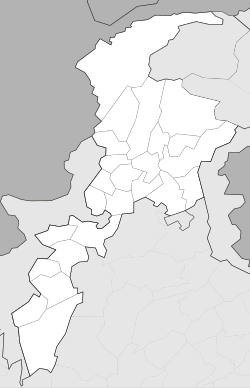Charsada
| Charsadda | |
|---|---|
| District Headquarter / City | |

Bacha Khan Chowk
|
|
| Coordinates: 34°9′0″N 71°44′0″E / 34.15000°N 71.73333°ECoordinates: 34°9′0″N 71°44′0″E / 34.15000°N 71.73333°E | |
| Country | Pakistan |
| Province | Khyber Pakhtunkhwa |
| District | Charsadda |
| Time zone | PKT (UTC+5) |
Charsadda (Pashto: چارسده) is a town and headquarters of Charsadda District, in the Khyber Pakhtunkhwa province of Pakistan. It lies about 29 kilometres (18 mi) from the provincial capital of Peshawar at an altitude of 276 metres (906 ft). The total area of Charsadda District measures about 996 square Km. The district is geographically organized into two primary parts: Hashtnagar (Pashto: Ashnaghar) and Do Aaba (Pashto: Duava). The city hosts the ruins of what was once the ancient Gandharan capital city of Pushkalavati (meaning Lotus City in Sanskrit), and home of the Sanskrit grammarian Pāṇini.
The earliest archaeological deposits recovered at Charsadda are dated to ca. 1400 BCE, constituting a series of post holes in association with ceramic sherds and ash. Subsequent periods indicate that more permanent structures were built at Charsadda, including stone-lined pits. Between the 14th century BCE and the 6th century BCE, when an Achaemenid presence is represented at the site (see below), the inhabitants of Charsadda developed an iron-working industry and used ceramics that are typical for this period in the Vale of Peshawar, Swat and Dir.
The father of Sanskrit grammar, Pāṇini was from this area and lived around 4th century BCE.
The later history of Charsadda can be traced back to the 6th century BCE. It was the capital of Gandhara from the 6th century BCE to the 2nd century CE. The ancient name of Charsadda was Pushkalavati. It was the administrative centre of the Gandhara kingdom. Many invaders have ruled over this region during different times of history. These include the Persians, Alexander the Great's Greeks, the Mauryas, the Greco-Bactrians, the Indo-Greeks, the Indo-Scythians, the Indo-Parthians, the Kushans, the Huns, the Turks, the Guptas.
...
Wikipedia


